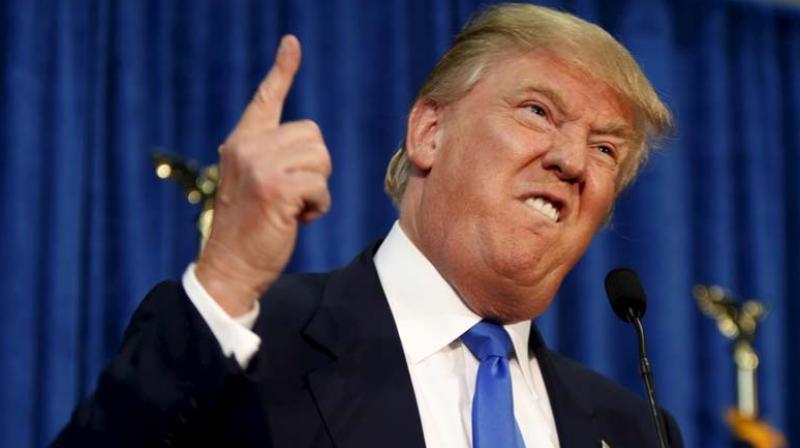If Nato were to collapse, would it really be such a bad thing?
Nato emerged at the start of the Cold War as a counterweight to the Communist bloc. It ought to have been wrapped up when the Warsaw Pact expired.

The chronicle of a disaster foretold: that’s one way of looking at Donald Trump’s recent foray into Europe.
At the headquarters of the North Atlantic Treaty Organisation (Nato), he doubled down on his insistence that the United States’ European allies were not contributing enough to the alliance, and appears even to have hinted that if they did not increase their military spending by January, America would be willing to go it alone.
He left the Nato summit claiming a victory, as he is inclined to do, with little evidence. Next stop: Britain, where first up he derided his host, Prime Minister Theresa May, in an interview with theSun, Rupert Murdoch’s appalling tabloid, and declared that her main rival for the leadership of the Conservative Party, Boris Johnson — a Trump fan who had resigned as foreign secretary just a few days earlier in protest against Ms May’s soft Brexit recipe — would make a great Prime Minister.
He also managed to wrong-foot Queen Elizabeth II before heading off to Trump Turnberry, his luxury golfing resort in Scotland. By the time he boarded Air Force One to head off to the Finnish capital for his summit with Russian President Vladimir Putin, Ms May had revealed that the US President’s advice to her on Brexit focused on the idea that she should stop negotiating with the European Union and sue it instead.
Shortly before Mr Trump left for Helsinki, the US authorities indicted a bunch of Russians for their alleged role in interfering with the 2016 presidential election, which led to not only the usual Trump critics but even some of his occasional supporters to suggest that the Helsinki summit should be cancelled. Or that at least the US President should insist that the culprits be extradited.
Mr Trump was never likely to do anything of the kind, and he appears to have been thrilled by the counter-suggestion from President Putin of a joint investigation, whereby US personnel would visit their counterparts in Russia, who in turn would carry out the interrogation. That was one of the cues for the critics in the US, not just Democrats but also leading Republicans, to scream “treason”!
“Nothing would be easier politically than to refuse to meet,” Mr Trump told reporters in Helsinki. “I would rather take a political risk in pursuit of peace, than to risk peace in pursuit of politics.” That sounds like too sensible a position for Mr Trump to have come up with it himself. It was nonetheless as worthy as the President’s admission that stupidity on both sides accounted for the ridiculously poor relations between the two nuclear superpowers.
A civilised dialogue between the US and Russia — and before it, the USSR — has never done any harm, and Helsinki has in the past served as the site for productive negotiations, not least when Mikhail Gorbachev and Ronald Reagan almost agreed to abolish nuclear weapons. Mr Trump, too, cited the absurdity of the fact that the two nations between them own 90 per cent of the world’s nuclear arsenal.
The likelihood that he objects to this mainly on the basis of its cost to the US treasury should not deter anyone from welcoming the hint of a reduction in stockpiles.
It’s strange, albeit not entirely surprising, how those across the political spectrum who cannot get over the emerging evidence that Russian operatives sought to influence the result of the US presidential election, rarely — if ever — feel the need to admit that the US has been indulging in such shenanigans for decades in all parts of the world, not least in Russia itself.
What’s more, the FBI and the CIA, nowadays held up by some Mr Trump opponents as paragons of virtue and ultimate defenders of the American republic, have been among the primary perverters of democracy at home and abroad.
Besides, the threat Mr Trump poses to the Western alliance need not be viewed as an impending catastrophe. Nato emerged at the start of the Cold War as a counterweight to the Communist bloc. It ought to have been wrapped up when the Warsaw Pact expired.
Instead, as part of an unbecoming display of triumphalism, it has been stretched to the Russian border, and this month’s Brussels summit was intended in part to discuss its further expansion to encompass Ukraine.
That would be absurdly provocative. Besides, Nato’s interventions in Afghanistan and the Middle East bear no relation to its original intent. It would certainly be no tragedy if it crumbled and European liberal democrats learned to rely on their own resources. There is absolutely no reason why American troops should be based in Germany or South Korea so many decades after the wars that prompted those interventions.
There can be no doubt about Mr Trump’s obnoxious personality or his incompetence as a leader. But the vague possibility that some good may inadvertently flow from his presidency ought not to be discounted.
By arrangement with Dawn
H10

